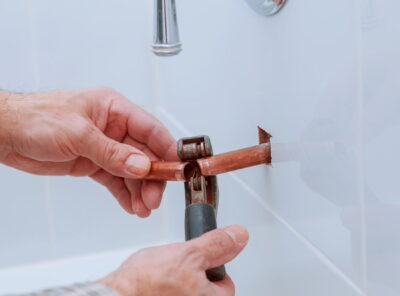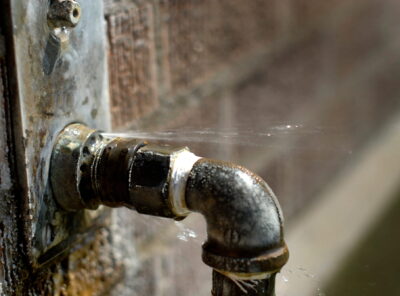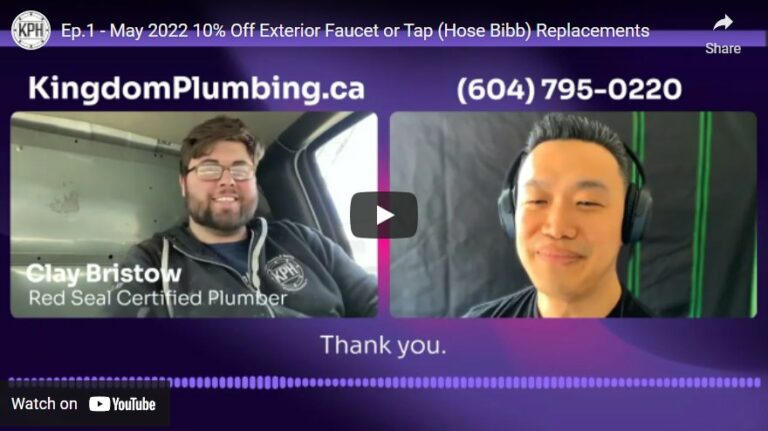Ep.2 Exterior Faucet or Tap (Hose Bibbs) Problems and Care
Show Notes
[00:00:00] Sherman Hu: Welcome to the 10-minute podcast powered by Kingdom Plumbing and Heating.
[00:00:03] We have Clay Bristow here. Clay, you were telling me about a story with homeowners and the hose bibbs (aka outside taps) for those who are not speaking “plumber talk.” Would you share again about hose bibbs, the care for it, and then that wonderful homeowner story that you told me about?
How do an exterior faucet/tap/hose bibb freeze and crack?
[00:00:22] Clay Bristow: Let’s say, for example, you live in a house and you have an outside tap and you accidentally left your hose on, through part of the winter. And at some point, the water that was trapped inside your hose froze.
[00:00:36] And what happens is the ice that forms in that hose, it starts creeping back towards the house. And eventually what can sometimes happen is it’ll freeze inside the tap.
[00:00:46] Imagine this is the handle, right? And there’s a stem that actually goes inside the house. That stem can become frozen, and it’ll split at the back.
…you live in a house and you have an outside tap and you accidentally left your hose on, through part of the winter. And at some point, the water that was trapped inside your hose froze. And what happens is the ice that forms in that hose, it starts creeping back towards the house. And eventually what can sometimes happen is it’ll freeze inside the tap. Imagine this is the handle, right? And there’s a stem that actually goes inside the house. That stem can become frozen, and it’ll split at the back.
Clay Bristow, Chilliwack Plumber
[00:00:56] But your handle is actually controlling a [00:01:00] spine that shuts it off at the end here. So when you have this off, even though it’s cracked here, it’s off here, so no water leaks.
[00:01:11] What happens is in the springtime, people open it and then the water comes into this kind of spine. And it’ll come out that crack.
[00:01:19] What happens is they don’t think about it. They hook a hose up to the tap. Or they just pull the one out that they left on all winter and then they hook it up to say, let’s say a wall sprinkler or something like they’re going to water their grass or something like that. What they’ll do is they will turn it on and then they’ll go about their business, go do something else.
[00:01:38] Let’s say you have a basement. So at ground level, that’s where your tap is outside. But then underneath is a basement in your house, underneath there’s a full basement it’s finished or something.
[00:01:49] Then all of a sudden one of the kids comes up and they’re like, “Oh, hey Mom, Dad, there’s water coming through the ceiling.”
Then all of a sudden one of the kids comes up and they’re like, “Oh, hey Mom, Dad, there’s water coming through the ceiling.”
Clay Bristow, Plumber in Abbotsford, Chilliwack, Hope BC
[00:01:56] What has happened is that it’s coming through that crack. But you [00:02:00] only notice it because you turned on your outside tap and it only cracked because you potentially left a hose on through the winter.
How do I check if my hose bibb cracks and leaks?
[00:02:09] A good practice is: Turn on your hose bibb. If you have access to it some way, if there’s an access panel or if it’s into your crawl space, some people get lucky, let’s say you have a rancher, and so you just have one floor it’s just ground level. But underneath you is a crawl space.
[00:02:27] Then sometimes what you can do is turn on the tap and you can get underneath and you can check to see if potentially there’s any water coming down.
[00:02:36] It’s also a good time to check your foundations for leaks.
A good practice is: Turn on your hose bibb. If you have access to it some way, if there’s an access panel or if it’s into your crawl space, some people get lucky, let’s say you have a rancher, and so you just have one floor it’s just ground level. But underneath you is a crawl space. Then sometimes what you can do is turn on the tap and you can get underneath and you can check to see if potentially there’s any water coming down. It’s also a good time to check your foundations for leaks.
Clay Bristow, Plumber
Story of Chilliwack homeowner and her cracked hose bibb/exterior faucet/tap
[00:02:39] A couple of weeks ago, I got a call from this lady, very nice lady. And she is in a complex that I’ve worked in a lot different clients. And so she called me to come and look at her tap because she was concerned. Cause she thought she had left a hose on [00:03:00] during freezing period.
[00:03:00] She had taken it off, but she wasn’t sure if she’d got to it in time. And so she just wanted me to check and make sure everything was fine.
[00:03:09] I turn the tap on. And then she had what I was describing. She has a rancher. And then underneath her is a crawlspace. So I turned on the tap, I let it run.
[00:03:19] And then I went down into the crawl space to see if I could see any water dripping through the hole where the water line went up to meet the hose bibb, because that’s where the water would show. You might see some dripping there and then you would know,
[00:03:31] “Oh, there’s something wrong. You better shut it off. Open up the wall and replace it or something.”
[00:03:36] But what was interesting is I got down there and there was water in the crawl space. However, it wasn’t coming from inside the hose, like inside the wall where I thought.
[00:03:48] What was happening was she had a crack in her foundation, where the hose bibb was. And because I had turned the hose bib on and because it was just draining out, I had [00:04:00] it on, and it was just spraying out onto the kind of the ground there. It was seeping into the ground and then it was coming through this crack in her crawlspace, in the foundation. And it was flooding there a little bit.
[00:04:12] And so that was something interesting. I hadn’t seen before, which isn’t too common, but so I I informed her about it recommended that she call somebody that kind of deals with that kind of stuff. Obviously I don’t fix foundations or anything like that, but yeah, she would need somebody to come in and basically repair that some way and check for any other cracks in the foundation too.
[00:04:32] During our flood that we had in the Fall there, I guess the early winter, she had a lot of water in her crawl space, and that’s probably where it’s coming from.
[00:04:44] So that’s interesting. It’s good to just check in the springtime, when you’re turning on your hose bibb, it’s always good to just look, just check it out.
[00:04:54] Cause the last thing you want to do is set it and forget it, leave for the day or something. And all of a [00:05:00] sudden you come home and your house is flooded because the hose bibb is cracked, and you didn’t know. Always good to check.
[00:05:10] Sherman Hu: Clay, are you saying, “Check your hose, if not, you’ll get hosed.”
[00:05:14] Clay Bristow: Yeah, that’s a good one. Don’t want to get hosed by the hose bibb.
[00:05:22] Sherman Hu: Is this a common issue?
[00:05:24] Clay Bristow: … the hose bibb cracking? Yeah. I see that quite commonly. I’d say every spring I replace, and I’m a small company, probably do about 10 to 20 every spring…
[00:05:36] Sherman Hu: …during the springtime?
[00:05:38] Clay Bristow: During the springtime specifically.
[00:05:39] That’s why we put it on special. Just because you’re using it for the first time that year. And it happens, right? You use your hose all summer. And then you maybe wash your car a couple of times in the fall, and then it gets raining and awful. And you’re like, ah, I don’t want to wash my car anymore, but you forget to take your hose off.
[00:05:58] And then all of a sudden we get a little bit [00:06:00] of a cold snap in November, and even that’s enough to freeze your hose. And once your hose is frozen, that ice creeps up and gets into your hose bibb. And then let’s say even if you take your hose off before we hit December, if it, if we did get freezing in November and you didn’t take the hose off, it could have split that.
[00:06:20] Yeah, you just forget, so it happens, but yeah, it’s a pretty easy fix for us. We find out where it’s coming into the house and, either we cut an access hole and replace with an access panel and replace the hose bibb.
[00:06:32] If you get lucky and it’s accessible somehow already, like it’s into a crawlspace or maybe it’s underneath your stairs, going up to your second floor or something. So it’s commonplace to put them too, then we can replace it, without an access panel.
[00:06:45] Sherman Hu: That’s a great a tip and consideration. For somebody who’s not so savvy, what is the check to make sure there’s no moisture or water?
[00:06:58] Clay Bristow: In a perfect [00:07:00] world, you already have access to it. So whether it be…
[00:07:04] Oh, geez, sorry. I got a spider that just came down on me.
[00:07:08] Sherman Hu: Be careful you might turn into The Spiderman.
[00:07:08] Clay Bristow: Yeah. That’d be cool though, actually.
Clay Bristow: Oh, geez, sorry. I got a spider that just came down on me.
Sherman Hu: Be careful you might turn into The Spiderman.
Clay Bristow: Yeah. That’d be cool though, actually.
[00:07:10] Whether it be that you already have access to it, so it’s somewhere that where it is. Most common, their in the wall. If you can see it, and you have access to it, then you just turn it on and you just look at it, you just look at it and you can see it, whether it’s dripping or not.
[00:07:24] If it’s in the wall, that’s a little trickier. You just want to run it and then you just want to listen at the wall. Potentially look, clear the area around the wall, on both sides of the wall and see if you see any water trying to build up or spill out of the wall.
[00:07:41] But typically if it’s split, you’ll know. It’ll make itself quite obvious, quite quickly that it’s split, if it’s in the wall.
[00:07:51] Unless you have a crawl space and then the water’s going down into the crawl space and then you might not notice. So in that case, you got to get into your crawl space.
[00:07:59] If you have a water [00:08:00] leak, it makes itself obvious, without too much, but yeah, it’s good to check.
[00:08:06] Sherman Hu: For homeowners, this is the first time looking into this kind of situation, do all plumbers know how to take care of hose bibbs well? Or some better than others?
[00:08:18] Clay Bristow: Plumbers vary in terms of their skill level but I’d say most plumbing companies should be able to handle that for you. It’s a very common issue. It’s just as common as unclogging a toilet, I’d say. So you’re a plumber, you should probably know how to do those things.







